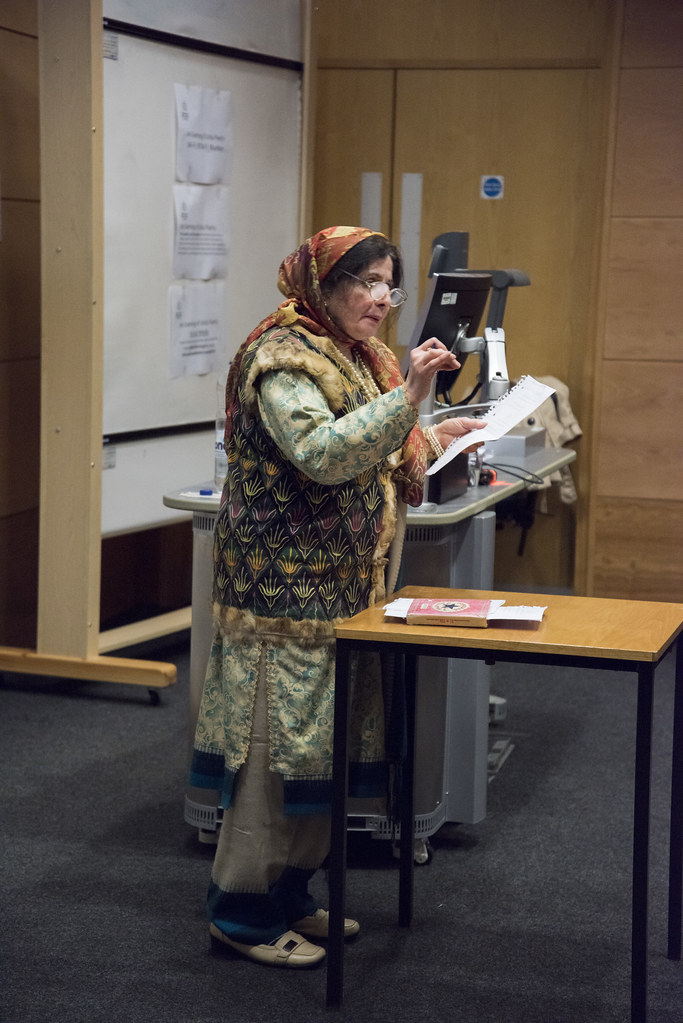Words: Pierangelly Del Rio Martinez
Photography: Delia-Adriana Tanase
The Manchester Writing School at Manchester Met presented an Evening of Urdu Poetry this week, organised in partnership with Manchester Muslim Writers, to celebrate the city’s recent designation as a UNESCO City of Literature.
Dr Jess Edwards, Head of English at Manchester Met, was one of the esteemed writers and academics involved in the bid proposing Manchester as a City of Literature. In conversation with Humanity Hallows, he commented:
“The International Mother Language Day happens on the 21st of February and there are often lots of events around that day, so we decided to put on a series of events during this week to celebrate Manchester’s mother languages; the languages most widely spoken in Manchester.”
When asked why Urdu specifically, Dr Edwards explained, “Urdu is one of the sixth most spoken languages in Manchester, so we thought it would be good to have a literature event that celebrated that language as the same time as the literature. The idea is to look across Manchester, all the different languages and cultures. And that’s the aspiration of Manchester City of Literature, to celebrate diversity, languages and cultures.”

Urdu poetry is a rich, ancient tradition, whose many of the poetic forms and structures are of Arabic origin. Today, is widely recognised in cultures of South Asia, such as Pakistan and India. The event introduced the public who didn’t know about this type of poetry to “Mushairas”, poetic expositions in which poets read their work to a wide audience. To set the informal and jolly mood which characterises such gatherings, attendees were welcomed with traditional South Asian dishes, made by award-winning programme MetMunch.
Professor Sharon Handley, Pro-Vice-Chancellor of the Faculty of Arts and Humanities greeted the attendees and introduced the event highlighting Manchester’s rich literary heritage, calling it a “city of poetry”.
She said, “Unlike The City of Culture, UNESCO’s Creative City status lasts forever and has the potential to change the way the city is perceived, both from the inside and from the outside as creativity takes a much more central place in its identity. We’re not just the city of sports, the city of enterprise but the city of literature and particularly poetry. So, the vision for the Manchester City of Literature is to celebrate and promote writing in all forms, from song lyrics and spoken word to fiction and poetry and from the many languages and cultures present in the city.”
Professor Handey also commented how this could be the first time for some members of the audience experience Urdu poetry in a Mushaira. She added: “This is what we hope Manchester City of Literature will be about: new readers, new writers, new audiences in new places. And a new sense of coming together, exchanging experiences and ideas.”
Zahid Hussain, writer of The Curry Mile and Anjum Malik, lecturer in Creative Writing, introduced the poets and provided background about what Mushairas are traditionally like. Anjum commented: “This is no poetry performance like any other English performance, where you sit and all the work is done by the poet. In here, you have to work as an audience.”
In Mushairas, the audience responds to the poetry that is being read to them, asking the poet to read a fragment once more or complementing their work loudly.
The evening wasn’t any different, with Urdu-speaking poets reciting their works in their mother tongue, just to be cheered and praised by an enthusiastic audience. Despite the fact that most of the poetry was in Urdu, some poets offered brief translations for the non-Urdu speakers. Most of the work covered diverse themes such as the human experience, the expression of the heart, feelings, and thoughts, as well as descriptions of life written with imagination and humour.
Anjum Malik herself, read a poem in English and Urdu, depicting the lives of farmers she met during her trip to India. She captured the farmer’s expression in her verses, as well as a depiction of the kind of nature they experience as part of their everyday lives.
The language, far from being a barrier, allowed the public to appreciate the musicality of Urdu, the metre of the poetry and the emotions of their writers, as well as the reception of the public, making it an opportunity to experience culture, poetry and the richness of language in one evening.
Upcoming events hosted by Manchester Writing School include Green Noise and Gravestones: A Reading of Poetry and Prose on Monday 5th March and A Body of Words on Wednesday 14th March.








1 Comment
Indeed, Urdu poetry Shayari always gives pleasure to me. I feel a lot of comforts when I read or listen to Urdu poetry.